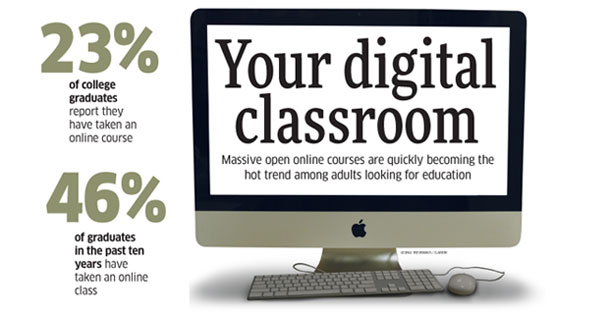Free online classes open to anyone interested in the topic being taught could be in Madison College’s future. A group from the college is looking into offering massive open online courses (MOOCs), but it’s “just in the early stages of investigation,” said Madison College Provost Terry Webb.
The difference between a MOOC and a traditional online course is that MOOCs are free, don’t offer credit and allow anyone to enroll with no limits. This new form of teaching expands distance learning that many have hopes will revolutionize higher education.
Webb believes that MOOCs can help students prepare for college level work. “That would be a great service to students. I also think that MOOCs can offer courses you couldn’t get anywhere else, classes like higher level physics offered by MIT that wouldn’t normally be offered or available at a 2 to 4 year college.”
According to the New York Times, MOOCs have been around for a while, however, it has been in the past year, that the number of offerings and the level of participation has skyrocketed. Although some MOOCs predated it, a course on artificial intelligence offered by Sebastian Thrun and Peter Norvig is noted as a major step forward in large-scale learning. Over 160,000 people signed up for the course. The popularity of the course spawned a number of technology centered learning enterprises including Coursera (through Stanford), MITx (from Massachusetts Institute of Technology) and edX (via Harvard).
Originally, online courses were structured similarly to brick-and-mortar classes where enrollment is limited and materials and information is meted out by the instructor (via a file servers or on-line sources). As Ken Masters, in an article in the Internet Journal of Medical Education, framed it, lectures were conducted by the “sage on the stage” via video lectures. Online courses eventually evolved to include chat rooms and more open source information.
MOOCs differ from earlier on-line learning efforts in that they involve a higher level of student interaction and decentralize the learning process. MOOCs seem to be traditional learning meets social media meets Wikipedia wrapped up with video games. Basically, instructors run regular live sessions with repeats offered on line. The instructor keeps track of discussions and events and acts more as a learning facilitator. Students are expected to conduct independent searches for additional material and to participate in interactive quizzes and other assignments. Grading and feedback are set up to be electronically scored or assessed.
“MOOCs are a complement to traditional coursework but not a substitute, at least not yet. The best way to know about these is to take one and see what you think. It’s free, at least right now, but I suspect it won’t be free for too much longer,” commented Webb.


























